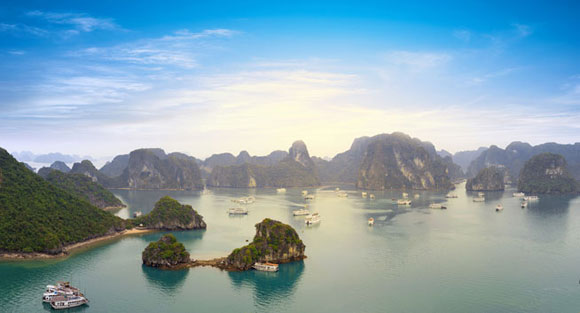Real Estate in Hanoi, Vietnam
Foreigners have been able to buy property in Vietnam since July 2015, but the property must be located in a subdivision within an approved project. There are a limited number of approved projects in Hanoi, however the majority of them are located away from the city center.
Vietnamese citizens and overseas Vietnamese (Việt Kiều) can own property free and clear, but the best that foreigners can get is a 50-year lease with one additional 50-year extension. Foreign purchasers can do whatever they like with their property. It’s legal to rent it out, sell it for a profit, use it for collateral, donate it, or inherit it.
The most convenient development is the Golden Westlake, which overlooks West Lake in Tay Ho District. The project was completed in 2010 and is just two-and-a-half miles northwest of Hanoi’s central business district. The 270 condos in this development are offered from $232 to $316 per square foot, depending on the size of the unit and whether it offers a view of the lake. There are also a few villas at the project.
Vincom Royal City is a large development in Thanh Xuan District, which is about four miles southwest of the city center. The 3,500 condos here range from $232 to $344 per square foot. On-site amenities include a large shopping mall, an international school, and a branch of the internationally accredited Vinmec Medical Center. The project was completed in 2013 and the high-end units have potential for good rental income returns.
There are a few other projects where foreigners can purchase housing, but these tend to be located well away from the city center. Working expats can consider investing in these properties, as they may be near an international school or their place of employment, but most people will prefer being closer to the central business district.
Since property ownership is a recent change in Vietnam, not all of the supporting civil laws are clear yet. For example, if a foreigner sells a property to another foreigner, it’s not yet known whether the buyer will be eligible to receive the entire 50-year lease or only receive a lease equal to the amount of time remaining on the seller’s original purchase.
Another complication could arise when selling the property, as currency restrictions prohibit sending money overseas unless stringent conditions are met. If overseas funds are used to purchase the property, it’s strongly recommended that this is clearly documented, and that the seller uses the same bank when they sell, so that there is no ambiguity as to where the money originated. It’s essential to use an attorney when buying or selling property in Vietnam.
Real estate may be listed in U.S. dollars, but the actual transaction must be in Vietnamese dong.
Buying costs are low. Fees include a 0.5% stamp duty (registration fee), and a notary fee of $50 plus 0.06% of the property value over 1 billion dong (about $45,000). There is also a personal income tax of 0.65% assessed on condo purchases.
Sellers will need to pay a sinking fund fee of 2% to cover serious repairs or catastrophic damage and 2% personal income tax on the transacted value of the home. Additionally, capital gains that result from the transfer of real estate are taxed at a flat rate of 25%, after acquisition costs and incidental costs are deducted from the gross sales proceeds.
A 10% Value Added Tax (VAT) is supposedly assessed and paid for by the seller, although it’s rarely, if ever, charged.
Buying property does not entitle the purchaser to a long-term Vietnamese visa.
Image: ©iStock.com/sergwsq

